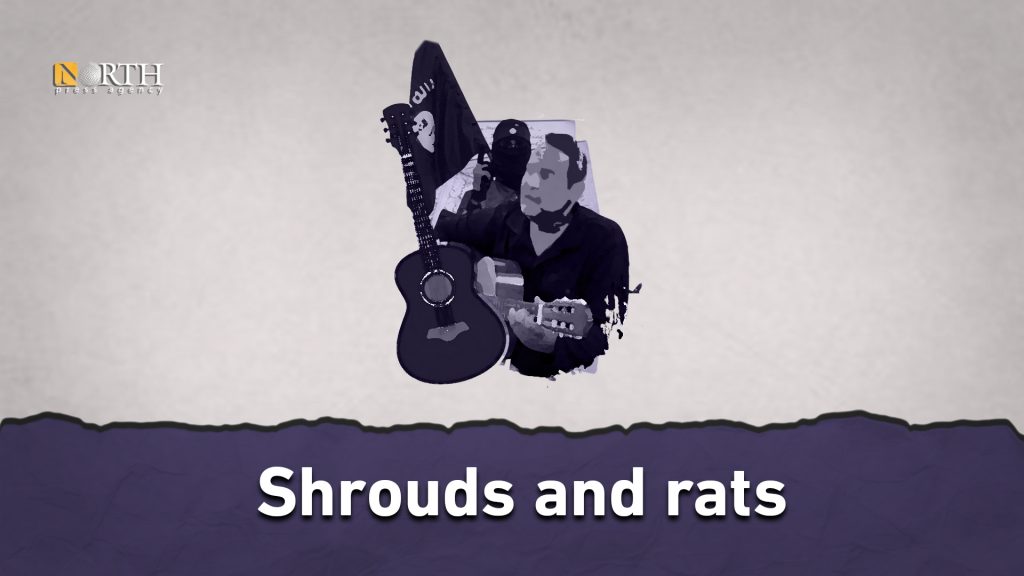RAQQA, Syria (North Press) – As the Islamic State (ISIS) took over the northern Syrian city of Raqqa early in 2014, Khamis al-Ta’meh, 48, rushed to hide his oud for fear of a penalty that could reach “beheading.”
Musicians and folk singers then, had to face an exceptional terrifying reality. The city of Haroun al-Rashid was no longer the same after being controlled by ISIS, which forced all to hide their musical instruments which they would deprive of them for four years.
“Just thinking of playing was impossible. I had to go to remote places to quench my longing to play and sing,” said al-Ta’meh.

The extremist organization, ISIS, not only prevented people from practicing politics , thinking, watching TV, listening to the radio, or bringing up birds, but also prevented them from expressing their feelings as well, according to al-Ta’meh.
Music players created different ways to get rid of their instruments. Some shrouded them and put them in boxes and hid them somewhere in house, while others had to get rid of them forever by destroying them.
ISIS had a rat in every building whose job was informing ISIS about the residents and their behavior “That person used to overhear people in addition to smelling smoke of cigarettes,” al-Ta’umeh said.
While controlling the city, ISIS imposed strict laws that restricted the basic personal freedoms. It defined women’s clothing, prevented smoking and hookah, banned using mobile phones, and prohibited all intellectual and cultural activities.
Speaking to North Press, musicians said that residents fairly got used to that situation, and even after ISIS was expelled from the city, part of the population faced difficulty getting rid of things they were accustomed to during that period.
“The suffering that the musicians of Raqqa faced was very bitter. Just murmuring between you and yourself could have exposed you to an insult, “you could have been lashed in a square in front of people, or you could be sentenced to prison,” al-Ta’meh added.

After ISIS was expelled from the city in 2017 by the Syrian Democratic Forces (SDF) and the US-led Global Coalition, Khamis al-Ta’meh rushed to the place he hid his oud. He ripped the shroud and brought it to light again, just as he shrouded it first time when ISIS entered the city four years ago.
Al-Ta’meh, however, found his instrument in a bad condition, which made one of his friends to give him a new oud. “My fingers have become slow moving, as if I had not played before. I needed constant training and practice until I got back to my previous level of playing,” he sadly said.
“The Autonomous Administration reopened the cultural center, and now I freely practice my hobby. We, in the cultural center, are ready to welcome anyone who wants to learn music,” he noted.
Raqqa lacks private centers to teach music though.
Khalid Ibrahim, 50, an oud player too, who was present during ISIS’s control of Raqqa, said that the city is now a cultural center, as anyone wishing to establish his own project can open it without obstacles.
“I am confident that Raqqa will become an ideal city with its morals, art and values, despite some defects that affected it during the rule of ISIS,” Ibrahim added.
Rababa flicked off the dust
Abboud al-Shawakh, 52, a Rababa player, said that, like everyone else, he had to hide his instrument in an old box until it was dust off again after years.
He remembers the days before ISIS and how he used to go almost daily to private folk concerts with his instrument, along with a drum player.
“When I missed playing, I used to go near the box to get the rababa out, but I immediately moved away fearing of punishment,” he added.
“I was once asked by ISIS members if I still played. I answered, No, I repented and became religious, I said that for fear of punishment,” al-Shawakh noted.
In those lean years, al-Na’im Roundabout in the city center spread terror almost daily, and scenes of defendants being flogged and beheaded were shown in front of everyone.
Now, Khamis al-Ta’meh, Aboud al-Shawakh, and dozens of musicians and art enthusiasts are trying to forget that stage, and shake off their memories of the horror they experienced at the time, just as they removed the dust from their musical instruments.

